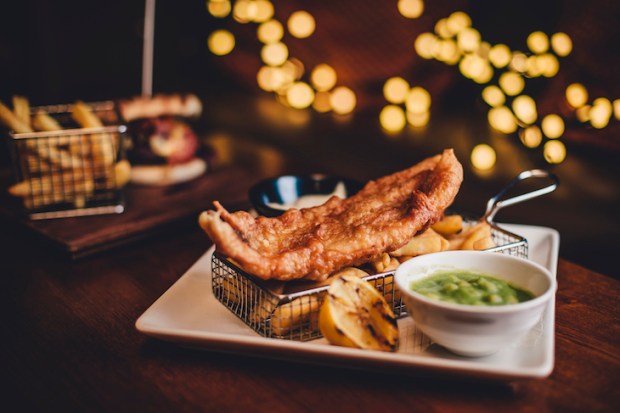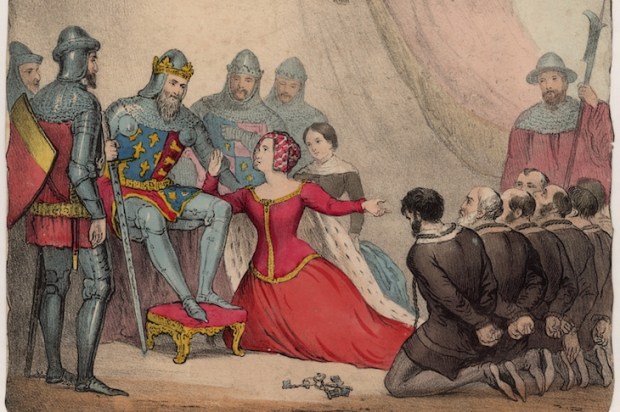There were six of us round the table to celebrate Trafalgar Day. We ate the same dinner served to Her Majesty the Queen aboard HMS Victory for the bicentennial: smoked salmon with two sauces (lumpfish caviar and dill); roast beef on a bed of cabbage with Dauphinoise spuds; and plums poached in red wine. We drank gin, home-made red wine, white Burgundy, Madeira and Marsala. Our host, chef and chief inspiration wore the HMS Jupiter T-shirt presented to him on his voyage from England to the first Gulf war. Our hostess wore an unprecedentedly slinky black cocktail dress. Catriona’s hair was in plaits. Tom and Tessa, whom I had not met before, were dressed casually and youthfully. I wore a Regency-buck tail coat with gold and silver curlicues, a jolly Jack Tar stripy T-shirt under a yellow moleskin waistcoat, blue neckerchief densely patterned with skulls, pillar-box red canvas trousers, a broad cowhide belt with a toy cutlass shoved through it, and fake blood smeared copiously about my visage. I’d come as Villeneuve, I told them.
We careered into the bottles and decanters on the table, which were as thickly clustered as masts at a Spithead review. Besides toasting ‘the Immortal Memory’, we lifted our glasses with the traditional navy toasts of ‘a Bloody War or a Sickly Season’ and ‘a Willing Foe and Plenty of Sea Room’. After that we descended into the only kind of dinner party I like: everyone tipping it back like there’s no tomorrow and shouting across one another.
The traditional Trump discussion didn’t rear its ugly head until the plums. Peripheral roaring died away and a measured conversation coalesced piously around the Donald. With the exception of Villeneuve, with his toy cutlass and fake blood coming out of his ears, the crew were united in their contempt and loathing for the man. To snorts of derision I opined that the man was a political genius. Yes, but what about his unconscionable attitude to women, they said? I said that it was my experience that most men talk like that in the absence of women. In any case, I added, while everyone regained consciousness, wasn’t the guy simply putting himself up as a lightning rod for dissent against the political elite? Maybe, they said, plums in their mouths, but what is so wrong with political elites? By and large, political elites mean well, they said. Don’t they?
What about a sea shanty, I said? All day I had been listening to sea shanties on Spotify, downloading the most stirring ones, and typing out duplicate lyrics. I distributed the song sheets, married my phone to the portable Bluetooth speaker, selected ‘Up She Goes’ (sung by the Fishermen’s Choir) and whacked up the volume. ‘Up She Goes’ is a simple tune with simple lyrics. It goes something like this: ‘And I kissed her on the face/ And the crew begins to roar/ Oh, oh, and UP she goes, we’re bound for Baltimore.’
In subsequent verses, as the crew roars him on, the boastful narrator kisses her on the cheeks, neck, lips, heart, legs, knees and, finally, ‘everywhere’. The Trump opposers yelled out the chorus — Oh! Oh! and UP she goes! — lustily. I was not the only one doing the actions, though I was the only one on my feet, first crouching low then springing up and brandishing my fists.
Nicely warmed up by that, we Jolly Tars next sang the lilting shanty ‘Rolling Home’: ‘Call all hands to man the capstan/ See the cable run down clear/ Heave away and with a will boys/ For old England we will steer.’ (The stirring chorus — ‘Rolling home, rolling home, rolling home across the sea/ Rolling home again to England/ Rolling home dear land to thee’ — has been impossible to erase from the forefront of my mind ever since. Yesterday I played it through headphones and sung along on the rower at the gym.)
Finally, we quietly remembered that vain and tender individual whose memory we had gathered to commemorate. ‘Not the least glory of the navy,’ observed Joseph Conrad, ‘is that it understood Nelson.’ Nelson was seldom well throughout his career. Competitively, we listed his injuries and illnesses: seasickness, scurvy, malaria, dysentery, typhoid, yellow fever, gout, septicaemia. His teeth fell out. More famously, he was blinded in the right eye and his right arm was amputated below the elbow. At Trafalgar he was downed finally by a musket ball fired from 50 feet away, which penetrated his shoulder, smashed his spine and punctured his aorta.
The dinner broke up relatively early because our host, who was once shot by a sniper, was leaving early the next morning to report for a week on the break-up of the migrant camp at Calais. As we parted, we wished him well, saying that we hoped he would avoid there at least some of the other maladies and afflictions endured by Lord Nelson.
The post Low life appeared first on The Spectator.
Got something to add? Join the discussion and comment below.
Get 10 issues for just $10
Subscribe to The Spectator Australia today for the next 10 magazine issues, plus full online access, for just $10.
You might disagree with half of it, but you’ll enjoy reading all of it. Try your first month for free, then just $2 a week for the remainder of your first year.















Comments
Don't miss out
Join the conversation with other Spectator Australia readers. Subscribe to leave a comment.
SUBSCRIBEAlready a subscriber? Log in